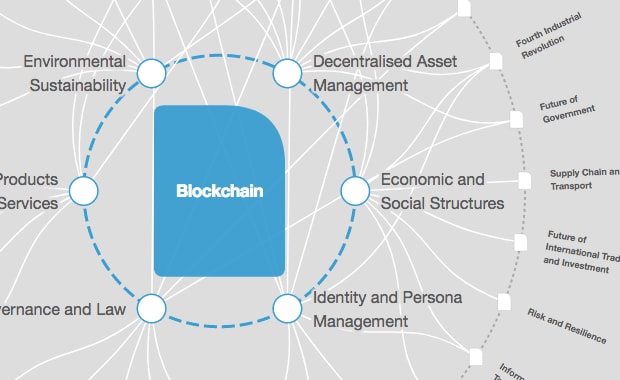How blockchain data storage can protect us from deepfakes

Deepfakes are just one of many risks in a world driven by AI. Image: Getty Images/iStockphoto

Get involved with our crowdsourced digital platform to deliver impact at scale
Stay up to date:
Blockchain
Listen to the article
- Artificial intelligence has great potential, but it also creates risks like deepfakes, biased data and data drift.
- The costs of AI's misuse are mounting, with vulnerability depending on how organizations manage their own data and internal systems.
- Using blockchain, decentralized cloud storage would offer a safer alternative.
The world is currently undergoing an AI revolution. With this comes great opportunity — but also new challenges and concerns.
Deepfakes and data integrity issues, for example, are yet to have a clear answer. The ethical and security implications are alarming as they can deceive and mislead individuals, leading to far-reaching consequences for both companies and individuals.
As one of many examples, an incident in China illustrates the threat: a deepfake scam defrauded an individual for $662,000. There are also instances of AI-driven chatbots that exhibit flaws and vulnerabilities, drawing attention to inaccuracies and combative behaviour.
Such instances underscore the susceptibility of AI to spread misinformation, jeopardize security and induce errors. The potential for AI to inadvertently share false information and breach security measures is rapidly emerging as a pressing issue — but decentralized cloud storage solutions could help.
Through decentralized cloud storage networks, data is securely stored in centres around the world, ensuring accessibility, verifiability, traceability and immutability when combined with the capabilities of blockchain technology. Blockchain is a form of Distributed Ledger Technology (DLT), in which the entire network works collaboratively to ensure the data’s integrity.
This approach tightens the vulnerabilities associated with single points of failure, reducing the risk of malicious attacks and data tampering while improving data security and trust in digital ecosystems.
Deepfakes and data integrity: understanding the risks
Deepfakes, a concerning AI-driven threat, use sophisticated algorithms to create highly realistic and deceptive media, such as videos and images, that can convincingly manipulate and replace the original content. These materials can be used for various purposes, including spreading misinformation, damaging reputations, influencing public opinion and facilitating cybercrimes.
Data integrity concerns also loom large in the AI landscape. As AI relies heavily on accurate and reliable data for training and decision-making, any compromise or manipulation of this data can seriously undermine the trustworthiness and effectiveness of AI systems, leading to biased results and ethical implications. Ensuring data integrity has become a critical aspect of responsible and ethical AI deployment across industries.
Decentralized cloud storage, with its daily checks for data integrity and a verifiable data chain of custody, is an effective solution to AI threats. This chain of custody feature refers to a documented and traceable data trail, providing the means to differentiate between a synthetic deepfake and the original, unaltered visual content. As deepfakes continue to contribute to the alarming trend of weaponized AI, robust data integrity solutions are increasingly important. Decentralized storage prevents unauthorized access by distributing data across a network of nodes (servers), ensuring authenticity and user control. This builds trust in AI-generated information as users can track data's journey and trust AI systems.
Proof of provenance mitigates AI risks
Proof of provenance within the context of decentralized cloud storage and AI is crucial. It refers to a method of verifying and documenting the origin, history and transformations of data throughout its lifecycle. Also known as data lineage, this approach creates a robust framework for ensuring the reliability and authenticity of data used in AI systems. Proof of provenance strengthens accountability and trust in AI-driven processes, addressing both technological and ethical considerations in the AI landscape.
Harnessing the power of blockchain technology for AI offers a promising approach to safeguard data integrity and solve the risks posed by centralization. Preserving data integrity in the AI era is not only a technological challenge but also an ethical responsibility, ensuring that AI-driven advancements continue to drive progress while upholding the highest standards of integrity and accountability. This holds paramount importance because by safeguarding data integrity, we mitigate the potential pitfalls of compromised data and uphold the highest standards of integrity and accountability. This ensures AI-driven advancements continue to drive progress in a trustworthy and reliable manner.

Data storage in an AI world
With the increasing reliance on AI, traditional centralized storage models are vulnerable, putting critical data at risk of compromise and manipulation. Already, companies are facing record-high costs of data breaches, particularly for companies using traditional models, emphasizing the urgency of modernizing data protection strategies. In fact, 82% of analyzed data breaches occurred in cloud environments, with 39% affecting multiple environments. This underscores the importance of organizations gaining control over data in hybrid clouds, focusing on encryption, rigorous data security and access policies.
Decentralized storage offers a strategic solution with distributed architecture and robust encryption, ensuring data integrity and countering AI threats, establishing a resilient and trust-based foundation for AI systems in our evolving digital landscape.
Don't miss any update on this topic
Create a free account and access your personalized content collection with our latest publications and analyses.
License and Republishing
World Economic Forum articles may be republished in accordance with the Creative Commons Attribution-NonCommercial-NoDerivatives 4.0 International Public License, and in accordance with our Terms of Use.
The views expressed in this article are those of the author alone and not the World Economic Forum.
The Agenda Weekly
A weekly update of the most important issues driving the global agenda
You can unsubscribe at any time using the link in our emails. For more details, review our privacy policy.
More on Emerging TechnologiesSee all
James Fell
April 26, 2024
Alok Medikepura Anil and Uwaidh Al Harethi
April 26, 2024
Thomas Beckley and Ross Genovese
April 25, 2024
Robin Pomeroy
April 25, 2024
Beena Ammanath
April 25, 2024
Vincenzo Ventricelli
April 25, 2024






